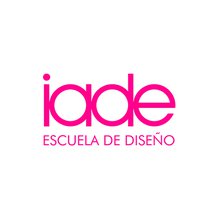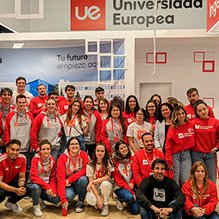At the Universidad Europea's Creative Campus, you have the opportunity to study the Bachelor's Degree in Interior Design in the heart of Madrid, in a unique environment with high-quality facilities and professional equipment that mirrors real-world industry standards. You will learn to develop creative and technical projects using the tools and resources required by the industry.
This degree will train you in key subject areas such as graphic design, digital design, decoration and drawing applied to interior design. You will learn the principles and essential techniques while working in state-of-the-art facilities, equipped with advanced technology.
What’s more, you will draw on the expertise of IADE School of Design, a leading institution with over 50 years of experience in the field, providing deep industry knowledge and valuable professional connections.
Official degree issued by Universidad Europea de Madrid
| Madrid (centro) | Start: September 2026 | School of Design and Creative Technologies |

This Bachelor’s Degree is taught in conjunction with IADE, School of Design, a school with over 60 years of experience and which has established itself as a prestigious and innovative institution in the field of interior design and fashion design, both in Spain and worldwide. Its primary objective is to provide personalised learning, to help you to learn and develop your own skills. The teacher-student relationship is of vital importance, based on stimulation, flexibility, closeness and dialogue.
First year
| Subject | ECTS | Type | Language of Instruction |
| Project Language | 6 | Basic | English |
| Drawing I | 6 | Basic | English |
| Representation Systems | 6 | Basic | English |
| 3D Design | 6 | Basic | English |
| History of Furniture I | 6 | Basic | English |
| Project Methodology | 6 | Basic | English |
| Color I | 6 | Basic | English |
| Materials I | 6 | Basic | English |
| Digital Drafting (CAD) | 6 | Basic | English |
| Art History | 6 | Basic | English |
Second year
| Subject | ECTS | Type | Language of Instruction |
| Residential Design Projects I | 6 | Compulsory | English |
| Installations | 6 | Compulsory | English |
| Drawing II | 6 | Compulsory | English |
| Digital Design I | 6 | Compulsory | English |
| History of Furniture II | 6 | Compulsory | English |
| Residential Design Projects II | 6 | Compulsory | English |
| Materials II | 6 | Compulsory | English |
| Color II | 6 | Compulsory | English |
| Digital Design II | 6 | Compulsory | English |
| Contemporary Interior Design | 6 | Compulsory | English |
Third year
| Subject | ECTS | Type | Language of Instruction |
| Public Space Design Projects I | 6 | Compulsory | English |
| Construction | 6 | Compulsory | English |
| Ephemeral Design Projects | 6 | Compulsory | English |
| Digital Design III | 6 | Compulsory | English |
| Applied Graphic Design | 6 | Compulsory | English |
| Public Space Design Projects II | 6 | Compulsory | English |
| Lighting Design | 6 | Compulsory | English |
| Execution Project I | 6 | Compulsory | English |
| Photography and Audiovisual Media | 6 | Compulsory | English |
| External Academic Internship | 6 | Internship | English |
Fourth year
| Subject | ECTS | Type | Language of Instruction |
| Execution Project II | 6 | Compulsory | English |
| Outdoor Space Design | 6 | Compulsory | English |
| Project Presentation | 6 | Compulsory | English |
| Oral and Written Communication | 6 | Compulsory | English |
| Digital Video | 6 | Compulsory | English |
| Design Business Management | 6 | Compulsory | English |
| Portfolio and Career Strategies | 6 | Compulsory | English |
| Final Degree Project | 12 | Final Project | English |
| Interior Design for Virtual Environments | 6 | Elective | English |
| Applied Professional English | 6 | Elective | English |
| University Activities | 6 | Elective | Spanish |
1
The first year provides students with the core principles of interior design, covering everything from project language and drawing to 3D digital representation, the history of furniture and art, colour and material theory, and the use of CAD tools.
This learning enables students to develop a solid foundation for interpreting, communicating and conceptualising design ideas—essential skills for collaborating effectively in creative teams and beginning to tackle entry-level projects in a professional setting.
2
In the second year, students will focus on design applied to residential spaces, the integration of technical installations, advanced drawing and digital design skills, and study current furniture and contemporary interior design trends.
Students learn to design functional and aesthetic environments, mastering the balance between technical and creative aspects, preparing them for careers in interior design studios and companies specialising in residential projects.
3
The third year will focus on projects for public and ephemeral use, construction, lighting, applied graphic design and photography. Emphasis is placed on practical application through external internships, allowing students to gain real-world experience in companies within the sector.
This year equips future professionals with the skills to face complex challenges in commercial, cultural or temporary spaces, thus reinforcing their multidisciplinary profile and their ability to manage comprehensive projects.
4
The final year culminates in students undertaking production-ready projects, designing outdoor spaces, and honing their oral and written communication and business management skills. They also develop their professional portfolio and prepare their end-of-degree project.
Students also have the option to specialise in virtual interiors or improve their professional english skills. This year enhances leadership, management and presentation skills that are essential for entering the job market, leading projects and becoming successful entrepreneurs in the field of interior design.
70.
2023/2024
Skills
Competencies
Knowledges
Start your future at Universidad Europea
You can become a student at Universidad Europea in three easy steps.
1
Start your admission process by calling +34 918257503 or request information and our advisors will contact you.
2
Once you have been admitted, secure your place by paying the reservation fee.
3
Submit the required documents to formalise your enrollment.
Scholarships and financial aid
We want to help you. If you want to study at Universidad Europea, you will have at your disposal a wide selection of own and official scholarships.
Credit recognition and transfers
You don’t have to stick with something you don’t like. That’s why we’ve designed specific plans for credit recognition and transfers.
Request your online credit recognition review, transfer your academic file and start studying at Universidad Europea.

Get to know the facilities and discover why Universidad Europea is made for you.
The Interior Design Degree will train you to become a professional capable of transforming spaces by combining functionality, aesthetics and comfort. Throughout the programme, you will acquire knowledge in key areas such as drawing, 3D representation, residential design, furniture history and art history, digital design, lighting and interior design. These subjects will prepare you to tackle complete projects, from conceptualisation to execution, designing residential, commercial and corporate environments. In addition, you will learn how to create sustainable and personalised spaces, adapted to the needs of the client and the latest trends in the sector.
Translated with DeepL.com (free version)
You can develop your career in architecture studios, agencies, real estate companies, or create your own interior design studio. You can work in a multitude of sectors: retail, hospitality and catering, museums and exhibition halls, creating temporary spaces for fairs and festivals, residences, or workspaces. It is a profession that improves people's quality of life by improving the spaces in which they live, work and enjoy themselves, spaces that are increasingly shared and dedicated to the well-being of each individual and society. You will be able to contribute your vision to the development of new scenarios for the future.
We are kicking off the 2024/2025 academic year with the opening of Creative Campus, the European University's school of design and creative technologies in central Madrid. This space will integrate art, design, and creative technologies such as video games and animation, offering first-class facilities and the opportunity to work with professionals on real-world projects.
Artificial intelligence is transforming interior design by enabling unprecedented personalisation and efficiency. With AI, interior designers can analyse data on preferences and trends to create spaces tailored to individual needs, optimise furniture layout, and select materials with greater precision. In our Bachelor's Degree in Interior Design in Madrid you will acquire the skills to integrate AI into your projects, allowing you to innovate in space planning and offer unique and functional solutions that enhance the user experience.
If you are passionate about creating spaces that combine aesthetics and functionality and have a taste for art and culture, the Interior Design Degree may be perfect for you. If you enjoy aesthetics, are attracted to the idea of leaving your mark through your work and transforming environments to improve people's lives, this degree will allow you to develop your full creative potential. Furthermore, if you are interested in creativity and innovation, enjoy working on projects that require you to move from thought to action, and are interested in areas such as architecture, design and the latest trends, interior design will open up a world of opportunities for you to express your vision.